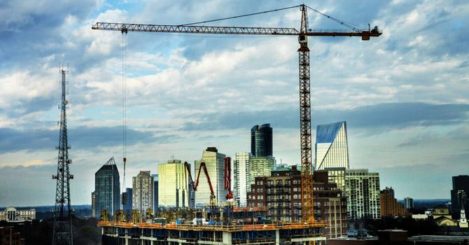Housing is a profound and even holy good, rooted in deeper notions of home. Christians are called to re-create communities where people of every income level and race can make our homes together.

Over the past few years, our church in Atlanta has become immersed in a new ministry, our eyes opened to a deep need in the community we had never recognized before: affordable housing. Today, we are a local center for citizen education and advocacy on housing issues. We host community organizing meetings every month. We have adult Sunday school classes on affordable housing. Our members attend city and county commissioner meetings to speak on housing issues. “Affordable housing for people in our community” is the main mission goal in our current three-year church plan.
Have we gone off the deep end with affordable housing? We don’t think so. We are increasingly convinced that affordable housing is the foundation of beloved community. Housing is a profound and even holy good. To understand why, we must understand what home is and what it means.
The first house I ever lived in was an old farmhouse on a hill in Vermont. Then there was our little yellow tract house in a North Carolina suburb, with a backyard and a swing set and boys all along the street who never tired of playing deep into the evening. The year I began fourth grade, in the mid-80s, we moved to Ohio, to a house on a quiet street with massive oaks and flowering crab apples. From that home, I could bike to school, to the park, to the house of the girl who was my first crush.
Home is a structure, but it’s more than that. Home is a whole environment. It’s what you see out the window; it’s the neighbors next door; it’s the opportunities in the community to learn and grow; it’s feeling safe…or not. It’s the sounds you hear at night before you close your eyes and dream. Home is a universe. Home makes us who we are.
Home is a structure, but it’s more than that. Home is a whole environment. Home is a universe. Home makes us who we are.
I was in college before I realized that my home was a creation of racism. The summer before I left Ohio, I worked for Habitat for Humanity in Columbus, delivering supplies to work sites all over town. I drove through neighborhoods I had never seen before, ones that people said were dangerous. The homes looked different from those in my neighborhood, and most needed work, but Habitat’s homes were lovely. And the people I met, many of whom were black, were friendly.
In my neighborhood across town, people were white, and my public high school of almost 2,000 students had only a handful of black and brown students. Why? No one I knew ever asked.
In college, however, I was assigned a research paper about the factors that influenced the development of my hometown. While home on break, I spent time in the local library, thumbing through clippings about the community’s founding in the early 20th century.
There, hidden in plain sight, was the answer: restrictive covenants. Deeds on houses on my side of town expressly prohibited owners from selling to people with brown skin. People of color didn’t live near me, but it wasn’t necessarily because they didn’t want to. For much of the town’s history, they were prevented by law.
Even after restrictive covenants were outlawed, brown people were hardly welcomed. Add in a strict zoning code that prevented the construction of rental units, and it was clear that our town was white and wealthy both by design and by flawless execution.
But we weren’t alone. Many communities in the United States developed the same way. In addition to restrictive covenants, discriminatory lending policies denied access to certain groups. The federal government had a policy in the mid-20th century of underwriting mortgages, but only for white people. Developers built entire suburbs with the assurance that the government would underwrite the mortgages, and it was white folks who got them. Black people weren’t offered mortgages; they lived in other neighborhoods, often renting from absentee landlords who knew that every dollar they put into maintenance would reduce their profit.
We know what these policies did to the United States in the 20th century. Driven by low-interest mortgages and white flight, our country split into wealthier white neighborhoods and poorer black and brown neighborhoods.
But skin color and economic status weren’t the only differences between those communities. People in the white neighborhoods were healthier, did better in school, felt safer, were policed less aggressively and grew even richer, thanks largely to the appreciating value of the homes they now owned. And nobody ever told me the truth: we designed it this way. White rich people here; black poor people there.
It’s time to stop. It’s time to undo what our parents, grandparents, and great-grandparents screwed up. It’s time to figure out ways to re-create communities where people of every income level and race can make our homes together. Our ancestors, with the help of government, broke our neighborhoods. It’s time for us to fix them.
What does all of this have to do with church? Everything, it turns out.
“Affordable housing for people in our community” is the main mission goal in our current three-year church plan.
First, we are the inheritors of a scriptural legacy of integration. Ever since Paul, Barnabas, Simeon, Lucius and Manaen gathered in Antioch (Acts 13), the church has offered the world a vision of integrated community. Integration is the work of the Holy Spirit.
Just as important, Jesus often provoked his followers to give up their wealth for something greater. Make no mistake—many Christians are financially invested in racial and economic segregation. I know because I am one of them, and Jesus has been asking me some hard questions.
When my family moved to the Atlanta area in 2010, we borrowed money to buy a home in a quiet neighborhood where kids play into the evening, like the home from my childhood. Since then, the value of our home has increased almost 80 percent. Why? Because the small school system in my town has excelled, while the large, diverse county school system that encircles us has struggled.
For years, many parents, if they can afford it, have moved out of the lower-performing school district into the higher-performing one. As a result, market pressures have pushed up housing prices, with some new homes in our community now costing over $1 million. Between 1990 and 2010, the percentage of African-Americans in our community declined by half, from 40 to 20 percent.
I’m a homeowner, so it’s in my economic interest to let the county school district struggle and fail; it’s in my economic interest to let poorer, browner people move away. New York Times columnist Charles Blow put it well in a speech he gave not long after Michael Brown was shot and killed by police in Ferguson, Missouri: “The value of your home on this side of town depends on that brown boy lying face down in the street on that side of town.”
He’s right. “Desirable” neighborhoods like mine depend on the existence of “undesirable” neighborhoods to keep their value. Jesus has been talking to me the way he did millennia ago to the rich young ruler.
Like that young man, my family is free to sell all that we have. But that won’t solve the housing problems our community now faces. Those were not created by individual choices, and individual choices won’t solve them. Segregation—and its insidious effects—was created by bad public policy; good policy must be part of the solution.
That’s where church comes in. In every community, people of faith have work to do to create and preserve adequate supplies of housing for people of all income levels. My congregation’s eyes were opened to this when a developer announced plans to build a large apartment complex across the street without a single unit of affordable housing. We were stunned to discover that county ordinances don’t require developers to include any affordable units in new construction.
Since then, housing has become a part of our ministry on many fronts. We’re lobbying our town to adopt an inclusionary zoning policy. We’re working to create a land trust to acquire and preserve affordable properties. And we’re investigating new zoning strategies that would increase housing supply and lower prices. I’m even serving on the Decatur Housing Authority board, where I’ve learned that housing authorities—though maligned and underfunded—can be remarkable resources for creating exceptional housing for people with modest incomes.
No single policy alone works. It takes many small steps over a generation to alter the housing landscape. But we must do this work now. All Christians should be leaders in transforming local housing policy.
Ultimately, it’s not about policy. It’s about home. As Christians, we have a God-given vision of home as beloved community. The racially engineered communities of my childhood—and perhaps yours—are not part of God’s vision for our life together.
In beloved community, all of God’s children live together on earth as in heaven, side by side, as neighbors. Christians believe that God is coming again to make God’s home with us. We anticipate that day by making our community a home that lives into God’s vision.
 The Rev. David Lewicki is co-pastor of North Decatur Presbyterian Church in Decatur, Georgia, and served previously as the associate pastor for young adults at the Marble Collegiate Church in New York City. He has a B.A. from Yale University and an M.Div. from Union Theological Seminary in New York. This article originally appeared in Faith and Leadership, and appears here with permission.
The Rev. David Lewicki is co-pastor of North Decatur Presbyterian Church in Decatur, Georgia, and served previously as the associate pastor for young adults at the Marble Collegiate Church in New York City. He has a B.A. from Yale University and an M.Div. from Union Theological Seminary in New York. This article originally appeared in Faith and Leadership, and appears here with permission.



One Response
David: Thanks for an inspiring story of creative, courageous, credible witness. I’m wondering if you have a video or pamphlet that tells a little more about this ministry. Our congregation would be helped by hearing the bigger story.